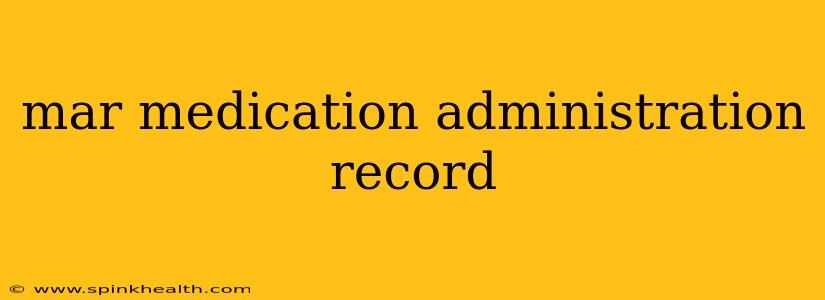The Medication Administration Record, or MAR, is more than just a piece of paper; it's the cornerstone of safe and effective medication management. Imagine it as a detailed story, meticulously chronicling each dose of medication a patient receives. This story, however, requires precision and accuracy to ensure the well-being of the patient. This guide will walk you through the intricacies of the MAR, answering common questions and providing crucial insights into its importance.
What is a Medication Administration Record (MAR)?
A MAR is a legal document that provides a complete record of all medications administered to a patient within a specific timeframe. It acts as a vital link between the physician's orders, the pharmacy's dispensing, and the nurse's administration of medication. Think of it as the central hub in a complex system, ensuring everything runs smoothly and safely. It's not just a list; it's a comprehensive record of each dose, including time, route, and any observations made before, during, or after administration.
What Information is Included in a MAR?
The information included in a MAR is designed to provide a complete picture of the patient's medication regimen. This usually includes:
- Patient demographics: Full name, date of birth, medical record number – crucial for accurate identification.
- Medication name: Both generic and brand names are often included to avoid confusion.
- Dosage: The precise amount of medication administered.
- Route of administration: Oral, intravenous, intramuscular, subcutaneous, etc. – the method of delivery is critical.
- Frequency: How often the medication is given (e.g., every 4 hours, twice daily).
- Time of administration: The exact time each dose is given, meticulously documented.
- Signature or initials of the administering nurse: Providing accountability and traceability.
- Any pertinent observations: Any reactions, allergies, or unusual events surrounding administration.
How is a MAR Used in Healthcare Settings?
The MAR serves several vital roles within healthcare settings:
- Ensuring medication safety: By providing a clear record of all medications given, it prevents errors like missed doses or medication duplication.
- Tracking medication effectiveness: Monitoring the MAR helps determine if a medication is working as intended or if adjustments are needed.
- Legal documentation: The MAR serves as a legal record, crucial for audits, legal proceedings, and ensuring compliance with regulations.
- Facilitating communication: The MAR facilitates seamless communication between healthcare providers about a patient's medication regimen.
What are the Different Types of MARs?
MARs can take various forms, depending on the healthcare setting and technology used:
- Paper-based MARs: Traditional handwritten records. While still used, they are prone to errors and are less efficient.
- Electronic MARs (eMARs): Computerized systems that improve accuracy, reduce errors, and streamline workflow. This is becoming the standard in many modern healthcare settings.
How to Properly Complete a MAR?
Accuracy and meticulous attention to detail are paramount. Any errors can have severe consequences. Key principles include:
- Legibility: Ensure all entries are clear and easily readable.
- Correct information: Double-check all details before documenting.
- Timely entries: Record medication administration immediately after completion.
- Following protocol: Adhere strictly to the facility's procedures for MAR completion.
What are the Potential Consequences of MAR Errors?
Errors on a MAR can have severe, even life-threatening consequences. These can range from:
- Adverse drug reactions: Incorrect dosage or medication can cause harmful side effects.
- Medication errors: Missed doses or wrong medications can compromise patient care.
- Legal ramifications: Incorrect documentation can lead to legal repercussions for healthcare professionals.
How Do MARs Contribute to Patient Safety?
By centralizing medication information, MARs significantly enhance patient safety through:
- Reducing medication errors: Clear documentation minimizes the risk of administering wrong medications or doses.
- Improving medication reconciliation: MARs facilitate accurate reconciliation of medications upon admission, transfer, and discharge.
- Enhancing communication: They promote effective communication among healthcare providers about a patient's medication status.
The Medication Administration Record is not just a simple record; it is a critical component of patient care. Its accurate and timely completion is essential for ensuring patient safety, improving healthcare quality, and upholding legal and ethical standards. Understanding its intricacies is crucial for everyone involved in medication management.

